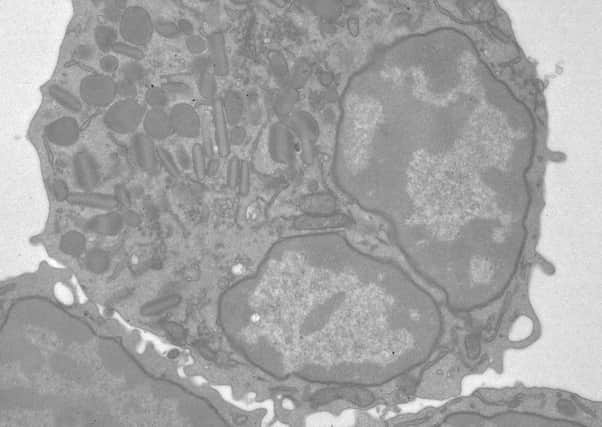Scots scientists offer fresh hope in treatment of asthma


Researchers made the breakthrough when they pinpointed a protein that is key to the survival of a group of these white blood cells known as eosinophils, which play a key role in the immune system.
It is hoped this protein could be manipulated to control their activity as the cells can be harmful in inflammatory diseases such as asthma.
Advertisement
Hide AdAdvertisement
Hide AdStudy leader Professor Colin Watts, from Dundee University, said: “Eosinophils play a key role in our immune system, protecting us from some infectious agents but, less desirably, also contributing to tissue damage in various inflammatory conditions.
“We have found that a particular protein called cystatin F is critical for the survival for this group of cells.
“That makes it a potentially attractive target to inhibit the activity of these cells, which may offer a completely new approach to controlling the kinds of inflammatory disease where eosinophils can be harmful.”
The cells contain toxic proteins which can be used to kill infectious agents which cause diseases such as elephantiasis.
However, these toxins can also build up when there is no infection present and cause substantial tissue damage in conditions like asthma where there is damage to the airways. “An intriguing puzzle has been how eosinophils safely handle and store these toxins and avoid killing themselves,” said Prof Watts.
“The toxins are only dangerous once they have been activated by enzymes called proteases.”
The research shows the protein can work like a safety valve and keep a brake on these enzymes but when it is absent then damage is done, he said.
Working with the Royal Veterinary College in London, the researchers discovered that the loss of cystatin F protein inhibits the ability to combat certain infections.
Advertisement
Hide AdAdvertisement
Hide AdHowever, it had a positive effect on asthma models as lung damage was significantly reduced.
Prof Watts said: “There are a large number of conditions where the production of excessive numbers of eosinophils can lead to damaging tissue reactions, asthma being a good example.
“Drugs that inhibit eosinophil survival are already being tested clinically so the discovery of a new factor that promotes survival of these cells is potentially important.
“More work is needed, but we think that blocking cystatin F function may offer a completely new approach to controlling this type of inflammatory disease.”